Strong law must muzzle the dogs of war
If globally-agreed rules of law prove impotent against Russia and Vladimir Putin over the illegal invasion of Ukraine there is little hope of preventing future conflicts, writes Morry Bailes.
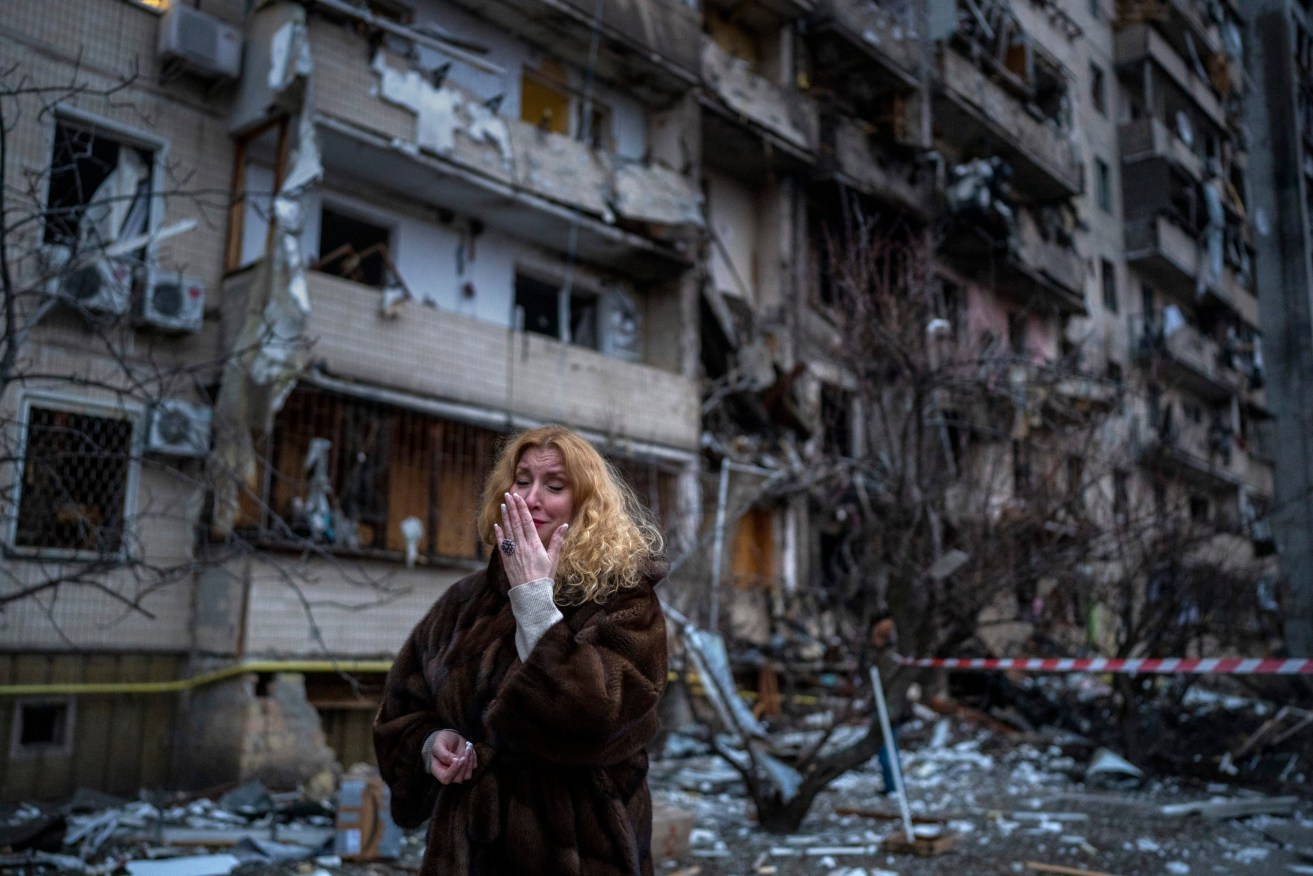
A resident outside her Kyiv apartment block targeted by Russian rockets during the Ukraine invasion. Photo: AP/Emilio Morenatti
As Europe yet again descends into war, we are reminded once more that we are the most intelligent, and belligerent, species on earth.
Many argue that war is our natural state. However, over the many human conflicts and as early as biblical times, if there was war, there was also law. The law of war is as old as war itself, and has been constantly evolving to this day. Now, developed countries will not embark on armed conflict unless their troops are accompanied by a lawyer to interpret the rules of engagement.
At such a time as this it is worth being reminded again of the law. And why although we are the most deliberately destructive of all species, we nonetheless attempt to regulate our aggression – for our own self-preservation – through complex international rules to either prevent or mitigate the damage of war.
The Old Testament spoke of the rules of war with principles and directions such as don’t cut down fruit growing trees of the enemy, and offer surrender as an option before the commencement of a siege. Even before the Roman republic, how to conduct war was subject to social and religious law. What has happened between then and now is the development of a complex web of international rules, norms, conventions and treaties, dating from about the mid 1800’s in Europe.
The Hague Conventions at the commencement of the 20th century form the early bones on which later conventions were added, most notably the Geneva Convention following World War 2. As we have developed different and more lethal weapons, conventions have been added or updated, such as the Convention on Cluster Munitions 2008, entered into as recently as 2010.
However the basics of war are simpler concepts to explain, and are innately understood, for example how to treat the wounded and POWs. They also explain why Russia’s invasion of Ukraine is fundamentally unlawful. Article 2 paragraph 4 of the U.N. Charter provides that:
‘All Members shall refrain in their international relations from the threat or use of force against the territorial integrity or political independence of any state, or in any other manner inconsistent with the purposes of the United Nations.’
Thus the act of Russia crossing the border and invading the sovereign territory of Ukraine was an act prohibited by international law, as all countries are now prevented from engaging in what was once called conquest. Conquest is the invasion of another country’s sovereign territory and annexation is retention of that territory by the aggressor nation. Conquest is now outlawed although conquest and annexation still occurs, such as Indonesia’s annexation of the former Portuguese colony East Timor in 1975, and Saddam Hussein’s 1990 attack on Kuwait. Fortunately such aggressive military invasions are now rare, but Russia has showed they are not extinct.
That is not to say Russia did not attempt to veil its actions in the false trappings of lawfulness. Although called out by the West in a unique and real time sharing of intelligence data, Russia employed all the old tricks to try to convince the waiting world that what was happening was no invasion at all.
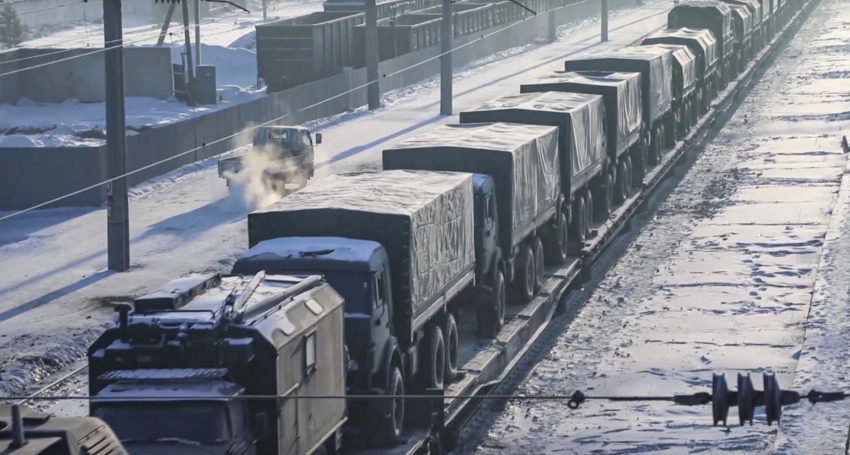
Russian military vehicles en route to Belarus for what was described as a joint military drill. Photo: EPA/Russian Defence Ministry
From troops being described as ‘peace keepers’, to the concoction of alleged provocative acts requiring military response, to a purported ‘recognition’ of the sovereignty of some of Ukraine’s eastern provinces, these were all transparent attempts to create a lawful commentary around what is in fact blatant breaches of international law when no lawful justification existed for Russia’s belligerent aggression.
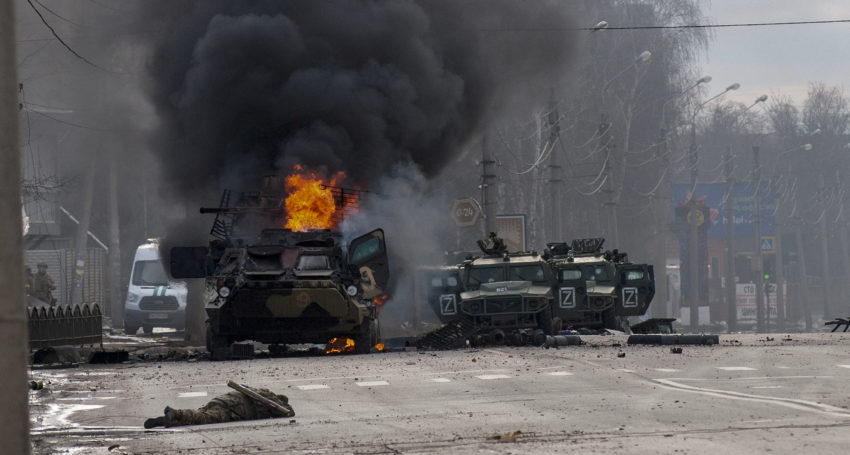
A Russian armoured personnel carrier burns after fighting in Kharkiv, Ukraine. Photo:AP/Marienko Andrew
What’s more, any dispute regarding territory in Ukraine’s east could be brought to the International Court of Justice in The Hague and dealt with according to law. Any nation with such a grievance may utilise an independent court to sort out arguments about borders and territories. Ukraine has also repeatedly attempted to convene peace conferences with Russia, to no avail.
Once the line is crossed and war commences, law regulates the way in which we are to engage in war. These principles are drawn from both law that we have created and signed up to, such as the Universal Declaration of Human Rights, the U.N. Charter, the Geneva Convention and conventions dealing with genocide and torture, amongst many others, as well as customary laws. Those lines we know we cannot cross even though, as every conceivable circumstance of war cannot be described and agreed to in an international instrument, no express law applies.
From this body of law and jurisprudence, much of which fell from the Nuremberg trials, we have the principles of war. Such things as proportionality, where a nation’s military actions cannot be disproportionate to the threat, and military necessity, the principle that troops cannot commit acts of war that are not part of the purpose or necessity of war.
War must be conducted with honour invoking the old codes of chivalry, must distinguish between civilians and combatants, and is bound by the principle of humanity, particularly relevant today as we employ more and more sophisticated long range weapons that can have devastating effect. Just look at war torn Kyiv and Kharkiv, and the destruction of civilian apartment buildings as an example.
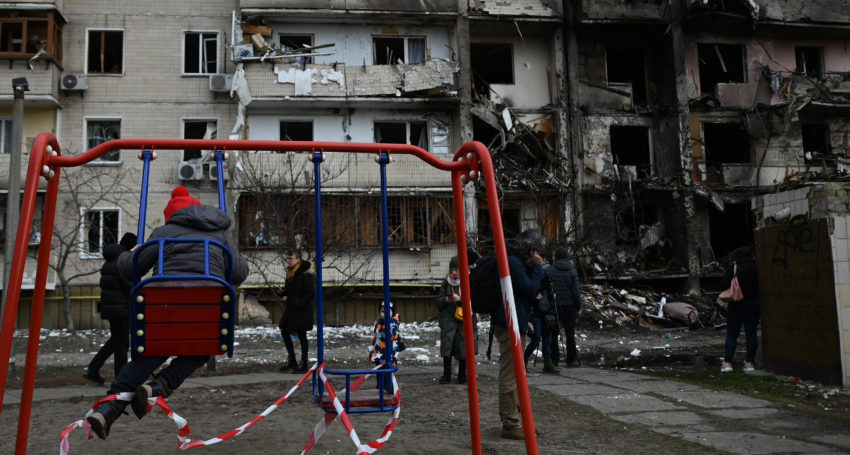
A child plays outside housing hit by Russian rockets in Kyiv. Photo: Justin Yau/Sipa USA
As to the veiled threat of nuclear weapons, there are strict international rules that apply to nuclear armaments but the principle of proportionality alone is sufficient in law to mean any deployment by Russia of nukes would be utterly unlawful. In short, no one is threatening Russia here. To respond to a ratcheting up of sanctions on Russia and the provision of weapons to a sovereign and independent Ukraine in order to defend itself, with the threat to deploy nuclear weapons, is, to state the obvious, completely disproportionate particularly when no nation is the slightest interested in infringing on Russia’s sovereignty.
If Vladimir Putin is to fall as a result of this situation, it will be from within Russia – not from any interference by the West. Anyway, in spite of Russia’s veto on the U.N Security Council, a ‘work around’ resolution is being drafted within the U.N. which if passed will likely endorse the bringing of sanctions against Russia and some Russians, and further, endorse the supply of weapons to Ukraine.
The law of war provides for specifics of war as well. Troops must openly carry arms, must be recognisable, and be commanded by a superior person who is responsible for their conduct. The Red Cross and other humanitarian agencies must be protected in order for them to do their work, and any country acting lawfully must at all times adhere to the principles of war.
If we cannot get this one right, what hope is there when it comes to Taiwan? And after that?
One reason for this article is to demonstrate how on no basis whatsoever is Russia’s invasion of Ukraine lawful conduct. It also cannot in any way be sheeted home to the West. It is disturbing that any person could make that claim, yet some are. What the West is guilty of is complacency. As the U.N. Secretary-General António Guterres said last week; ‘The use of force by one country against another is the repudiation of the principles that every country committed to uphold. This applies to the present military offensive. It is wrong. It is against the (United Nations) Charter. It is unacceptable.’
It is also clear that the majority of world public opinion is very much against the Russians, notwithstanding China’s unfortunate stance which fails to call out the blatant and demonstrable illegality of the Russian invasion. One may ask, what good are gatherings of crowds in major cities demonstrating their unity with Ukrainians and expressing their dismay at this show of Russian aggression? They speak loudly to the fact that not only does the world community indeed innately understand that what is occurring in Ukraine is unlawful, it is also a plea to Western governments and governments of the free world to continue to do something about this outrage.
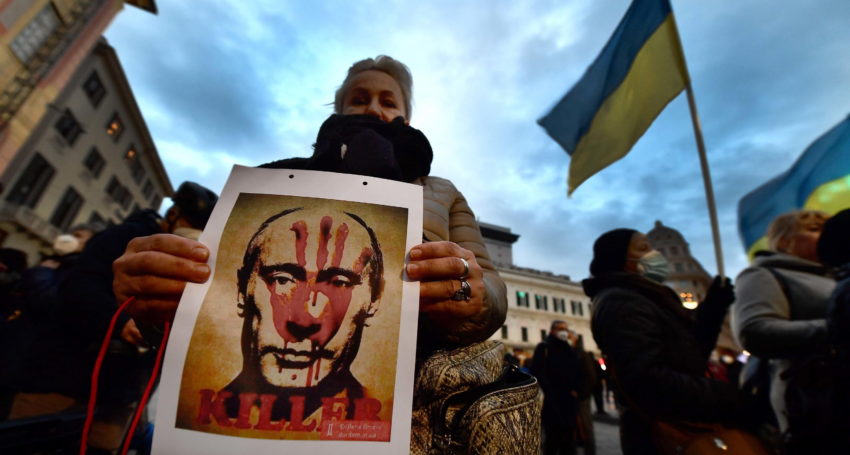
A protest in Genoa, Italy against the Russian invasion of Ukraine. Photo: EPA/Luca Zennaro
Although we have detailed and sophisticated international laws regarding war and peace, there is no international police force roaming the world to set right the wrongs and put out-of-line countries back in their box. It therefore becomes all the more important for right minded countries and citizens to call out what this is; a wholly unlawful and aggressive act that cannot be left unchallenged.
The reason we do not allow such aggression in law and must stand up to it with our actions, was perfectly described by the inspirational President Zelensky when he addressed the Munich Security Council two weeks ago. The thrust of that speech was that unless we confront this conduct it will continue. That this is not merely a war in Ukraine; it is a war, yet again, in Europe, and a war in Europe will impact each and every nation in the world, particularly if it bleeds out of Europe as we know it could given the lessons of the 20th century. In Zelensky’s words to the leaders of Europe: ‘Action is required. It is the world that needs it, not just us.’
That action likely runs deeper than we think. It goes beyond sanctions and troops. It goes beyond correcting the complacency of the West. It goes to reform of the very structures that are intended to maintain the law or war, and the international norms that we have enjoyed since the collapse of the Berlin Wall in 1989.
Whilst reading President Zelensky’s full speech is a must, it cannot be reproduced here, so let me leave you with some more of his words. Because of anyone in this theatre of war, of the many caught in this humanitarian disaster caused by the unlawfulness of Russia, he has earned the right to be listened to on this point.
In reference to the earlier 2014 Crimean conflict, the continued conflict in the east of Ukraine and the all too recent history of armed conflict in 20th century, Zelensky said to European leaders:
‘These are terrible lessons of history. I just want to make sure you and I read the same books. Hence, we have the same understanding of the answer to the main question: how did it happen that in the XXI century, Europe is at war again and people are dying? How did we get to the biggest security crisis since the Cold War? For me, as the President of a country that has lost part of the territory, thousands of people and on whose borders there are now 150,000 Russian troops, equipment and heavy weapons, the answer is obvious.
“The architecture of world security is fragile and needs to be updated. The rules that the world agreed on decades ago no longer work. They do not keep up with new threats. They are not effective for overcoming them. The security system is slow. It crashes again. Because of different things: selfishness, self-confidence, irresponsibility of states at the global level. As a result, we have crimes of some and indifference of others. Indifference that makes you an accomplice. It is symbolic that I am talking about this right here. It was here 15 years ago that Russia announced its intention to challenge global security. What did the world say? Appeasement. Result? The annexation of Crimea and aggression against my state.”
There we have it. With all the rules governing war and peace, with the many conventions and treaties agreed to in order to govern our aggression, if like the League of Nations our international bodies are ineffective and we do little and wait until it is too late, what will happen to us is entirely predictable. If we cannot get this one right, what hope is there when it comes to Taiwan? And after that?
Our international norms must be protected and aggressor nations held to account for unlawful acts of war. War crimes cannot go unpunished, and we ought to ensure that the machinery and architecture that underpin our rules based societies, such as the U.N., is properly fit for purpose. If this is not a wake up call to the West and the continuance of our way of life, I don’t know what is.
Freedom has a way of winning, eventually. It’s just that there can be great pain and heartache that go with the defending of it, as the people of Ukriane are currently enduring. The lessons of the past, of the 20th century, of the consequences of the appeasement of aggression, and the horrors of the Holocaust must never be forgotten. Law and a rule based society is only as good as its protectors. Within the bounds of what is lawful, it is time for NATO to step up.
Meantime as one wise judge said, ‘men born to freedom are naturally alert to repel invasion of their liberty by evil-minded rulers.’ There is yet hope; the hope of free people.
Morry Bailes is Senior Lawyer and Business Advisor to Tindall Gask Bentley Lawyers, past president of the Law Council of Australia and a past president of the Law Society of South Australia.




